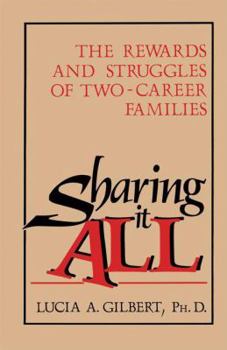Sharing It All
I realize more and more that to some degree psychol- ogists study their own lives. My first studies in the mid-1970s looked at the conflicts that emerge in dual- career couples as the partners combine their various roles. Ideas for the early studies initially came from con- versations with clients, friends, and people I met trav- eling. Soon after the topic of dual careers came up, dis- cussions of guilt and frustration followed. The partici- pants in my first studies turned out to be predominantly women. Men expressed little interest in participating. A common response was, "Talk to my wife. " 7 8 PREFACE Ostensibly, husbands saw their partners, but not themselves, as dealing with conflicting roles. Although I presumed this to be somewhat true, I knew from ob- serving my own husband that my having a career had an immeasurable impact on him. Were men denying something? Were women overly sensitive? Discussions with my husband, which helped me to get a better grasp on what male partners might be feeling, planted the seed for my subsequent book on men in dual-career 1 families, published in 1985. In gathering material for that book, I was struck by the contrast with men's ear- lier disinterest. Husbands appeared eager to talk about their lives. Their greatest concern-what happens to the children?-became the focus of my last set of studies. Why this book? "Sharing it all" symbolizes the es- sence of a two-career marriage.
Format:Paperback
Language:English
ISBN:0306429616
ISBN13:9780306429613
Release Date:January 1988
Publisher:Springer
Length:249 Pages
Weight:0.65 lbs.
Dimensions:0.5" x 5.5" x 8.5"
Customer Reviews
0 rating





